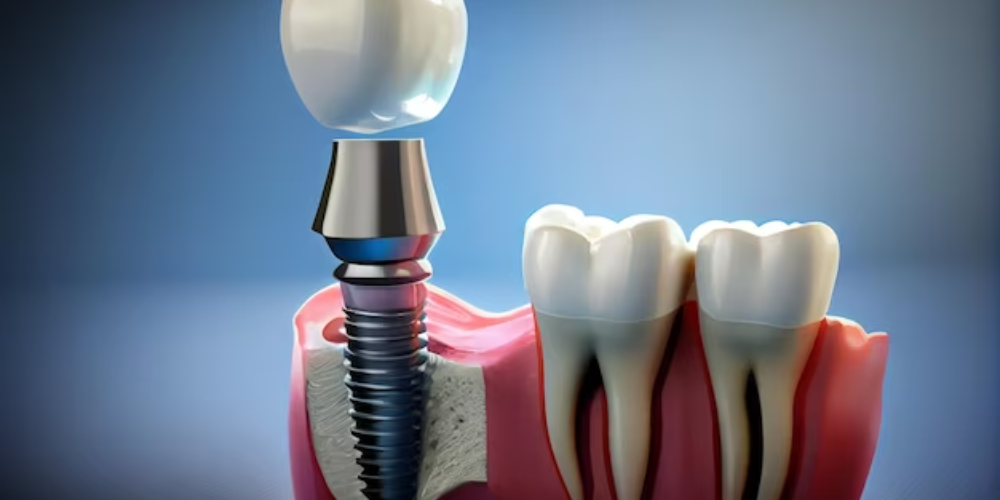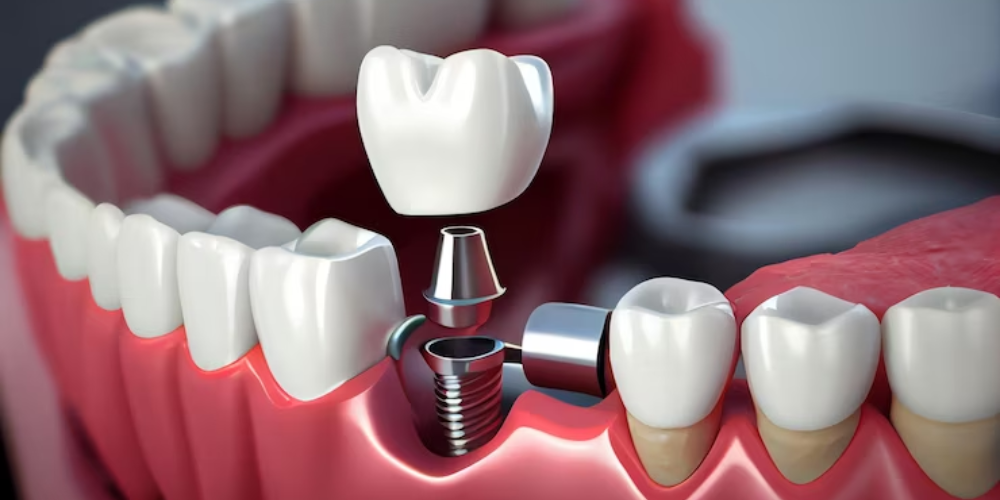Dental implants are an increasingly popular choice for replacing missing teeth, offering a long-term solution that looks and feels natural. However, the cost of dental implants can be a significant consideration for many people. In this comprehensive guide, we’ll explore everything you need to know about the cost of dental implants and what to expect throughout the process.
Understanding the Cost of Dental Implants
The cost of dental implants can vary widely depending on several factors, including the number of implants needed, the complexity of the procedure, the location of the dental clinic, and the quality of the materials used. Also, the price can increase significantly if additional procedures, such as bone grafting or sinus lifts, are required.

Factors Affecting the Cost
The cost of dental implants can vary widely depending on several factors. Understanding these factors can help you better anticipate the total cost of your dental implant procedure. Here are some key factors that can affect the cost:
Number of Implants: The number of implants you need will have a direct impact on the total cost. For example, a single tooth implant will be less expensive than multiple implants for a full mouth restoration.
Material: The material used for the dental implant can affect the cost. Titanium implants are the most common and are known for their durability and biocompatibility. However, they can be more expensive than other materials.
Implant Type: There are different types of dental implants, including standard implants, mini implants, and all-on-4 implants. The type of implant you choose will affect the cost.
Location of the Implant: The location of the implant in your mouth can also affect the cost. Implants in areas with less bone density or in areas that require additional procedures, such as sinus lifts, may be more expensive.
Additional Procedures: In some cases, additional procedures may be required before the implant can be placed. This can include bone grafting to strengthen the jawbone or a sinus lift to create more space for the implant. These procedures can increase the overall cost of the implant treatment.
Dentist’s Experience and Location: The dentist’s experience and the location of the dental clinic can also impact the cost. Dentists with more experience or those located in urban areas where the cost of living is higher may charge more for their services.
Pre-Implant Treatments: Before the implant can be placed, you may need to undergo certain treatments, such as tooth extractions or gum disease treatment. These treatments can also add to the overall cost of the implant procedure.
Follow-Up Care: The cost of dental implants may also include follow-up care, such as check-ups and adjustments. It’s important to factor in these costs when budgeting for your dental implant procedure.
What’s Included in the Cost?
The cost of dental implants typically includes more than just the implant itself. It’s important to understand what is included in the cost so that you can budget accordingly and avoid any surprises. Here are some key components that are typically included in the cost of dental implants:
Implant Fixture: This is the titanium post that is surgically placed into the jawbone to serve as a replacement root for the missing tooth. The cost of the implant fixture is usually included in the total cost of the dental implant.
Abutment: The abutment is the piece that connects the implant fixture to the crown or prosthetic tooth. It serves as a connector and helps to hold the crown in place. The cost of the abutment is typically included in the total cost of the dental implant.
Crown: The crown is the prosthetic tooth that is attached to the abutment. It is custom-made to match the shape, size, and color of your natural teeth. The cost of the crown is usually included in the total cost of the dental implant.
Consultations: The cost of consultations with the dentist to discuss your treatment plan and determine if you are a candidate for dental implants is often included in the total cost.
X-rays and Imaging: X-rays and imaging studies, such as CT scans, may be necessary to evaluate the health of your jawbone and determine the placement of the implant. The cost of these studies is typically included in the total cost of the dental implant.
Surgical Costs: The cost of the surgical procedure to place the implant fixture into the jawbone is usually included in the total cost of the dental implant.
Follow-Up Appointments: The cost of follow-up appointments to monitor the healing process and make any necessary adjustments is often included in the total cost.
Warranty: Some dental implant providers offer a warranty on their implants, covering the cost of replacement if the implant fails within a certain period. This warranty may be included in the total cost or offered as an additional cost.
Temporary Restorations: In some cases, a temporary restoration may be placed while the implant heals. The cost of this temporary restoration may be included in the total cost of the dental implant.
Financing Options
Here are some common financing options for dental implants:
Dental Insurance: Some dental insurance plans may cover a portion of the cost of dental implants, especially if the procedure is deemed medically necessary. Check with your insurance provider to see if implants are covered under your plan.
Flexible Spending Accounts (FSAs) or Health Savings Accounts (HSAs): These accounts allow you to set aside pre-tax dollars for medical expenses, including dental implants. Using an FSA or HSA can help you save money on the cost of implants.
Payment Plans: Many dental clinics offer payment plans that allow you to spread the cost of dental implants over time. These plans may require a downpayment and monthly payments until the balance is paid off.
Third-Party Financing: Some dental clinics work with third-party financing companies that offer loans specifically for medical and dental expenses. These loans typically have fixed interest rates and can be used to cover the cost of implants.
Discount Plans: Some dental discount plans offer reduced fees for dental implants and other dental procedures. These plans typically require an annual membership fee but can help you save money on the cost of implants.
Government Assistance Programs: In some cases, government assistance programs, such as Medicaid or the Children’s Health Insurance Program (CHIP), may cover the cost of dental implants for eligible individuals. Requirements and coverage vary by state.
While the cost of dental implants can be significant, many people find that the benefits, including improved oral health and confidence, are well worth the investment. By understanding the factors that influence the cost and exploring financing options, you can make an informed decision about whether dental implants are right for you. If you are considering dental implants, schedule a consultation with a qualified dentist to discuss your options and get an accurate cost estimate for your individual needs.
Dental Implant FAQs
Q: Does dental insurance cover the cost of dental implants?
A: Dental insurance plans typically do not cover the full cost of dental implants, as they are considered a cosmetic procedure. However, some insurance plans may cover a portion of the cost, such as the crown or bridge that attaches to the implant.
Q: Are there any additional costs associated with dental implants?
A: In addition to the cost of the implant itself, there may be additional costs for procedures such as bone grafting, which is sometimes necessary to ensure the implant has enough support. There may also be costs for consultations, x-rays, and follow-up appointments.
Q: Are there any ways to reduce the cost of dental implants?
A: Some dental offices offer discounts for paying in full upfront or may have special promotions or discounts available. Additionally, some dental schools may offer lower-cost implants as part of their training programs.
Q: How long do dental implants last?
A: With proper care, dental implants can last a lifetime. This makes them a cost-effective solution for replacing missing teeth compared to other options that may need to be replaced more frequently.




